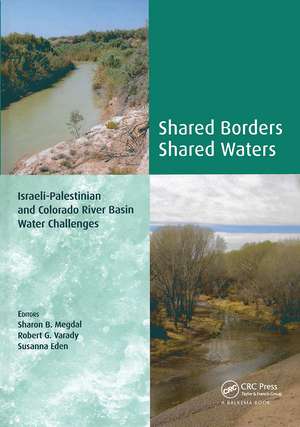Shared Borders, Shared Waters: Israeli-Palestinian and Colorado River Basin Water Challenges
Editat de Sharon B. Megdal, Robert G. Varady, Susanna Edenen Limba Engleză Hardback – 18 dec 2012
This volume is predicated on the role that “science diplomacy” can play in resolving difficult water-related issues. The history of natural-resources disputes confirms that the scientific approach can reveal ways to overcome division. Experience has shown that scientifically-trained experts who are sensitive to sociopolitical conditions can assist in developing and evaluating feasible water management solutions.
The insights and expertise of a distinguished and diverse group of researchers fill these chapters. Contributors include established authorities as well as a number of budding scholars. In a field traditionally dominated by males and by engineers, this collection benefits from significant gender diversity and contributions from a broad spectrum of disciplines. Policymakers, water managers, specialists such as university researchers and consultants, and citizens all have an interest in finding sustainable strategies to address the many water-management issues discussed in this volume. The assembled papers underscore that much work remains to be done.
Preț: 630.75 lei
Preț vechi: 880.06 lei
-28% Nou
Puncte Express: 946
Preț estimativ în valută:
120.71€ • 125.56$ • 99.65£
120.71€ • 125.56$ • 99.65£
Comandă specială
Livrare economică 22 martie-05 aprilie
Doresc să fiu notificat când acest titlu va fi disponibil:
Se trimite...
Preluare comenzi: 021 569.72.76
Specificații
ISBN-13: 9780415662635
ISBN-10: 041566263X
Pagini: 316
Dimensiuni: 174 x 246 x 18 mm
Greutate: 0.77 kg
Ediția:1
Editura: CRC Press
Colecția CRC Press
Locul publicării:Boca Raton, United States
ISBN-10: 041566263X
Pagini: 316
Dimensiuni: 174 x 246 x 18 mm
Greutate: 0.77 kg
Ediția:1
Editura: CRC Press
Colecția CRC Press
Locul publicării:Boca Raton, United States
Public țintă
Postgraduate and UndergraduateCuprins
1. Water Development: Infrastructure and Institutions; 2. Political and Economic Perspectives; 3. Learning from Comparison; 4. Challenges, New and Old: Climate Change and Wastewater; 5. Expanding Water Supplies: Promising Strategies and Technologies.
Notă biografică
Sharon B. Megdal is Director of The University of Arizona Water Resources Research Center and C.W. and Modene Neely Endowed Professor in the College of Agriculture and Life Sciences. She also serves as Director of the University of Arizona Water Sustainability Program. Her work focuses on state, regional and transboundary water resources management and policy. She places particular emphasis on how to achieve desired policy objectives in terms of institutional structures and possible changes to them. In 2010, she was named Distinguished Outreach Professor by the University of Arizona, and she serves as an elected member of the Central Arizona Project Board of Directors. Sharon B. Megdal holds a Ph.D. degree in Economics from Princeton University.
Robert G. Varady is deputy director of the University of Arizona’s Udall Center for Studies in Public Policy, research professor of environmental policy and of arid lands studies, and adjunct professor of hydrology and water resources. Varady has written extensively on transboundary environmental policy, and on global water initiatives and international water governance. He is a former president of the International Water History Association. Varady obtained his Ph.D. in 1981 in modern history from the University of Arizona, and B.S. and M.S. degrees in mathematics from the City College of New York and Polytechnic Institute of NYU, respectively.
Susanna Eden is Assistant Director of the Water Resources Research Center, University of Arizona. She worked internationally as North American coordinator for the UNESCO IHP HELP (Hydrology for Environment, Life and Policy) Program. Her research centers on policy and decision making in water resources and the use of scientific information by stakeholders and decision makers. She holds a Ph.D. in Water Resources Administration from the University of Arizona.
Robert G. Varady is deputy director of the University of Arizona’s Udall Center for Studies in Public Policy, research professor of environmental policy and of arid lands studies, and adjunct professor of hydrology and water resources. Varady has written extensively on transboundary environmental policy, and on global water initiatives and international water governance. He is a former president of the International Water History Association. Varady obtained his Ph.D. in 1981 in modern history from the University of Arizona, and B.S. and M.S. degrees in mathematics from the City College of New York and Polytechnic Institute of NYU, respectively.
Susanna Eden is Assistant Director of the Water Resources Research Center, University of Arizona. She worked internationally as North American coordinator for the UNESCO IHP HELP (Hydrology for Environment, Life and Policy) Program. Her research centers on policy and decision making in water resources and the use of scientific information by stakeholders and decision makers. She holds a Ph.D. in Water Resources Administration from the University of Arizona.
Recenzii
As global environmental and demographic changes heighten competition for limited water resources, we are thankful for efforts that attempt to harness science to achieve effective water-management policies. Shared Borders, Shared Waters is that rare book that seeks to promote this aim by drawing on the expertise of scientists and practitioners from sometimes-contentious border regions. In spite of its conflict potential, water connects rather than divides, giving us hope for increased cooperation and conflict avoidance. For the arid areas that are the focus of this collection, the book offers the promise of the best of science diplomacy.
— András Szöllösi-Nagy, Rector, UNESCO-IHE
— András Szöllösi-Nagy, Rector, UNESCO-IHE
Descriere
The book provides a comprehensive view from multiple perspectives of the complex, interacting world of water management in two distinct regions facing similar water resource challenges. It employs comparative analyses to highlight commonalities and differences and thus examines the potential of strategies for approaching current and future policy choices. At the same time, it makes the case for scientific enquiry to build bridges to solutions in contentious settings.
